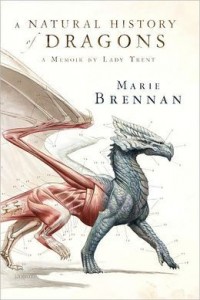 A Natural History of Dragons by Marie Brennan (Memoir by Lady Trent #1)
A Natural History of Dragons by Marie Brennan (Memoir by Lady Trent #1)
Genre: Fantasy, Historical Fantasy
Publisher: Tor Books on February 5th, 2013
Source: Purchased
All the world, from Scirland to the farthest reaches of Eriga, know Isabella, Lady Trent, to be the world’s preeminent dragon naturalist. View Spoiler »
As far as I’m aware, the style of A Natural History of Dragons is completely unique. It’s written as if it really were the first in a series of memoirs, with an elderly Lady Isabella Trent as the narrator of her youthful adventures. Now an established scientist and something of a national treasure, Isabella has decided – at the behest of her fans – to write about her early days as a natural scientist, before she was so highly respected.
And it took a while before that respect was afforded to her, which isn’t surprising given that A Natural History of Dragons is set in Scirland, an alternate Victorian England. I think we all know that women during that period were not to be studying ‘indelicate’ subjects like natural history, regardless of rank and individual interest. Isabella is no exception, and faces many barriers to her intellectual pursuits because of her sex. Conventional attitudes dictate that her passion for scientific study makes other peers think of her as bookish at best and a raving loony at worst.
But Isabella doesn’t care what anyone thinks, beyond her husband Jacob. Her curiosity about dragons and their anatomy must be satisfied. She is a woman possessed. A fair bit of good luck, guile, and desperation secures a position for Isabella and Jacob on an expedition to Vystrana, where they will be studying dragons in their natural habitat. Isabella swears up and down that she won’t go into the field to prevent endangering herself, but of course that lasts about two seconds. Soon she’s traipsing about the jungle, dealing with locals, smugglers, and the occasional dragon.
There are some very interesting moments between Isabella and Mr. Wilker, a brilliant lower-class scientist who’s also on the expedition. They’re pretty similar people, so of course they fight like cats and dogs. Both are brilliant scientific minds who have faced considerable censure and derision because of factors beyond their control. As someone without a title, Wilker has had to work doubly hard to ensure that he is taken seriously in scholarly circles predominantly dominated by the aristocracy. It’s through him that Isabella comes to the realization that her society limits people not just on the basis of sex, but class as well. It was nice to see her exhibit some empathy – for much of the book Isabella came off as pretty cold.
For a book titled A Natural History of Dragons there weren’t very many actual dragons in it. There are some pretty cool discoveries made about dragon kind and their anatomy, but that’s about it. It seemed like there was a lot more time spent talking about dragons than actually encountering them. There were also some things about Isabella that didn’t work for me. She’s quite dismissive of “regular” women who enjoy their lives of marriage, motherhood, and managing their households. There was an ironic kind of elitism there: Isabella is mocked and barred from scientific circles because of because of negative assumptions about female characteristics, and then she engages in this very sexism herself. She’s also pretty dismissive of one of her friends, who likes romantic stories and novels. How dare she enjoy things that aren’t about science!
Isabella may not be interested in romantic stories, but she does love her husband. Sadly Jacob was one of the least-developed secondary characters, and it seemed like he didn’t have much of a personality beyond his interest in dragons and love for Isabella. Pretty convenient, if you ask me. While I get that Victorian marriages weren’t usually love matches, I was hoping for something more than we got. If you’re going to include romance, make it a good one! My expectations were pretty low though, once I realized that elderly Isabella is Lady Trent, not Mrs. Camherst. Make of that what you will.
Overall, I thought that A Natural History of Dragons was a very creative book, but I didn’t get swept away like I thought I would. I liked Isabella and empathized with her at some points; I didn’t love her the way I wanted to. I did love Marie Brennan’s writing, though. Despite my quibbles with this one, I will happily read the next installment and recommend it to those who like biology and don’t mind a slower pace.